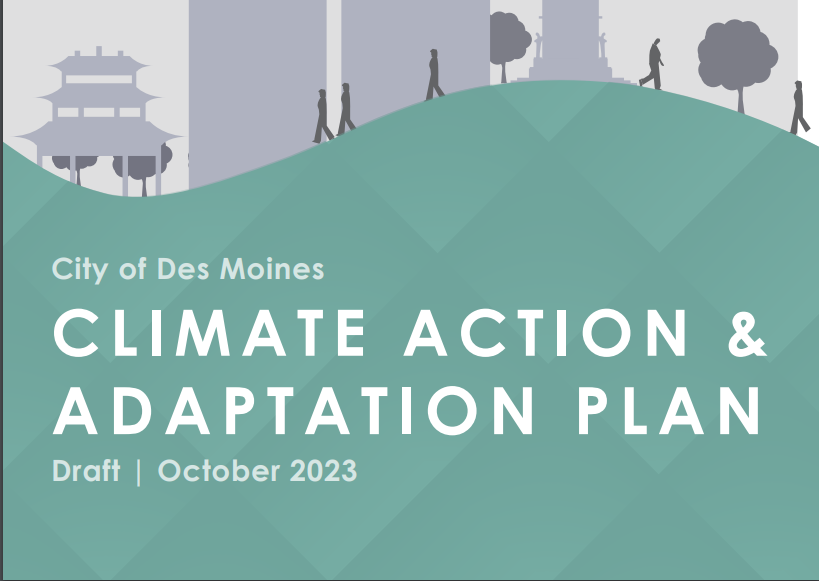Des Moines' climate-adaption plan approved by City Council
The Des Moines City Council on Monday night unanimously approved its ambitious climate action plan, which aims to reach net-zero greenhouse gas emissions by 2050 in Iowa's capital city.
Plans outlined in Des Moines' 104-page ADAPT DSM playbook include making city buildings more efficient, improving access to alternative forms of transportation such as walking, biking and transit, and investing in alternative sources of energy such as solar panels for city buildings and incentives for homeowners to install them on their roofs.
It also discusses how the city could respond to natural disasters and climate change by taking actions such as planting 3,800 trees a year, addressing flood and drought resiliency, increasing access to locally grown food, and reducing and diverting waste to landfills.

Phoning into the council meeting from a climate conference in Dubai, Des Moines Mayor Frank Cownie thanked the city staff and community who contributed to ADAPT DSM, adding that the plan is meant to be flexible as climate circumstances and technology change.
"The urgency is greater today than ever it's been in the past to begin immediately the work to protect our city, our state, our country for the future and all of our future generations," Cownie said.
Jeremy Caron, sustainability program manager for Des Moines, said the plan is intended to be a roadmap for decision-making, policy and program and initiative development. It has four goals:
Decrease emissions 28% from 2008 levels by 2025.
Decrease emissions 45% from 2010 levels by 2030.
Make 100% carbon-free electricity available at all times by 2035.
Reach net-zero greenhouse gas emissions by 2050.
In the weeks leading up to the vote, some council members expressed concerns about the costs to homeowners over calls for residential energy use to decrease 26% by 2030.
Many Des Moines residents may be asked to retrofit older homes to become more energy efficient, since more than half were built before 1960, "and older homes are often poorly insulated, resulting in additional energy use and costs from heating and cooling that can burden household finances," the plan says.
"Additionally, existing natural gas systems, like gas stovetops and furnaces, contribute to climate pollution and release air pollutants that threaten human health."
At a work session in November, council members Joe Gatto and Linda Westergaard said they would have liked more residents to be involved in the plan, adding that less than 1% of residents have been engaged throughout the planning process. Westergaard also said she worried about heftier costs for homeowners, developers and builders.
Caron said it's true that homeowners will incur the greatest cost over time from programs and initiatives such as the mitigation of waste, retrofitting older homes and utility upgrades. But research and building code analysis also show that, in many cases, the "overall lifetime operation" of building clean energy homes is "significantly less," he said.
Additionally, Caron and City Manager Scott Sanders say the city plans to help mitigate the costs, which could include rebates; incentives such as abatements, if, for example, there are additions to homes; and incentives for new construction.
The city needs to "grow into" clean energy shifts through incentives rather than take regulatory actions — such as requiring all homes to be electric — which would "be more harmful than beneficial," Sanders said.
Des Moines environmentalists rejoice in ADAPT DSM approval
At a pro-ADAPT DSM rally ahead of the council's vote, Hannah Hayes, co-president of Roosevelt High School's Environmental Club, quoted Swedish climate activist Greta Thunberg to express "the frustration young people feel toward our government that continues to prioritize economic growth over climate action."
"However, our economy will suffer much more when natural disasters cost trillions of dollars every year," Hayes said. "So we need climate action now and we need ADAPT DSM."
Carolyn Uhlenhake Walker, member of the Des Moines Citizen Taskforce on Sustainability, a local grassroots organization of residents and representatives from environmental groups, said the approval is cause for "celebration," but she doesn't want the plan to get "dusty on a shelf."
"We want it implemented and we want it implemented 100%," Uhlenhake Walker said. "We want Des Moines to be a guiding light to the metro area."
During the meeting, council member Josh Mandelbaum called the climate action plan the "bare minimum," noting there is a need for more specificity, as well as evolution. One change, he said, could be to use "better numbers" for the social costs for carbon, an estimate of the cost, in dollars, of the damage done by each additional ton of carbon emissions, according to The Brookings Institution.
"But this is a good plan and the things that I would like to see added to the plan — the specificity, the actions — are things that we can address going forward and, hopefully, build consensus on those items as we take future steps," Mandelbaum said.
Virginia Barreda is the Des Moines city government reporter for the Register. She can be reached at vbarreda@dmreg.com. Follow her on Twitter at @vbarreda2.
This article originally appeared on Des Moines Register: Des Moines climate plan aims for net-zero greenhouse emissions by 2050

